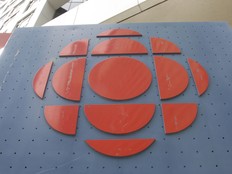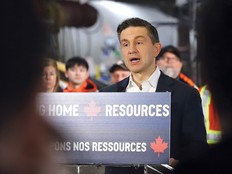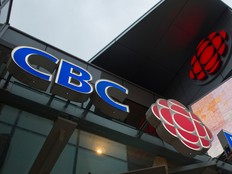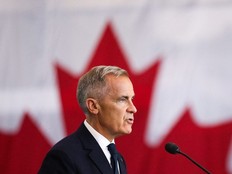Kris Sims
LATEST STORIES BY KRIS SIMS
SIMS: Smith needs to secure Fortress Alberta
The Alberta government is spending more than $79.3 billion this year, an increase of 8.4% from last year. The second highest jump in spending in Canada. What Albertans pay on debt interest charges is more than double what the province is spending on Public Safety and Emergency Services.

SIMS: CBC set to get more money and power
Canada’s government news organization is set to get fatter and more powerful. In the middle of the election campaign, Prime Minister Mark Carney vowed to pay the CBC more money, waving around about $150 million in fresh taxpayer cash. CBC covered that big scoop with a headline calling the CBC “underfunded.” Think about that scene. Imagine being a CBC employee asking questions at a news conference during the election, with Carney saying that, if he won, the CBC would get more money, while Conservative Leader Pierre Poilievre said he would defund the CBC. The CBC covered this funding story in the middle of the election. That’s a conflict of interest so big it would dwarf Godzilla. Journalists should not be paid by the government and that scene in the election is a perfect illustration of why. In the speech from the throne, the Carney government announced: “The government is determined to protect the institutions that bring these cultures and this identity to the world, like CBC/Radio-Canada.” To get an idea of what that protection could look like, consider the federal government report delivered on Feb. 20, before the election. Former heritage minister Pascale St-Onge said the government should nearly double the amount of money the CBC gets from taxpayers every year. “The average funding for public broadcasters in G7 countries is $62 per person, per year,” St-Onge said. “We need to aim closer to the middle ground, which is $62 per year per person.” If the government funded the CBC that way, the CBC would cost taxpayers about $2.5 billion per year. That amount would cover the annual grocery bill for about 152,854 Canadian families. St-Onge also pushed for the CBC mandate to be expanded to “fight against disinformation.” “I propose to anchor in CBC-Radio Canada’s mandate its role in helping the Canadian population fight against disinformation and understand fact-based information,” St-Onge said. Carney’s Liberal party platform pledged to “fully equip them ( CBC) to combat disinformation, so that Canadians have a news source they know they can trust.” What does this mean? Will the CBC play a role as an official “fact-checker” in Canada, or is this just clunky language urging the CBC to be more fact-based? What is clear is that the federal government is planning to hand the CBC more money and enshrine its funding into law, taking it out of the annual budget vote and clouding transparency. CBC hasn’t improved its accountability after years of scrutiny from Canadians. Former CEO Catherine Tait was being paid about half a million dollars per year. New CEO Marie‑Philippe Bouchard has started her new role where Tait left off, as she is also set to be paid between $478,300 and $562,700. After years of criticism over executive bonuses, the government media company finally said it would get rid of the bonuses but hike the salaries of the executives instead. With so many Canadians struggling to pay for the basics, the CBC needed to read the room and end the bonuses and knock the CEO down a few levels in pay. Taxpayers are forced to spend a lot of money on the CBC, but only a tiny fraction of them choose to watch it. For CBC News Network’s flagship English language prime-time news program, the audience is 1.8% of available viewers, according to its latest quarterly report. That means more than 98% of TV-viewing Canadians chose to watch something else. The CBC is a waste of taxpayers’ money. Nearly nobody is watching it and it is a severe conflict of interest for journalists to be paid by the government. The CBC doesn’t need more money from taxpayers; it needs to be defunded and raise money based on its work. Kris Sims is Alberta director for the Canadian Taxpayers Federation and former longtime member of the Parliamentary Press Gallery.

OPINION: Canadians win when politicians compete on tax cuts
The best way the government can make life more affordable is to let people keep more of their own money and tax cuts will do just that. After years of higher taxes, this election is turning into a tax-cutting campaign. Liberal Leader Mark Carney announced he would cut the lowest income tax bracket by one percentage point. Carney estimates that would save a two-income family up to $825 a year. Conservative Leader Pierre Poilievre announced he would more than double Carney’s promised income tax cut. Poilievre would cut the lowest income tax bracket from 15% to 12.75%. That would save a two-income family up to $1,800. Both major parties are duelling over who can cut taxes the most. So far, Poilievre is offering twice as much income tax relief as Carney. Poilievre’s tax cut would cover the cost of groceries for a family of four for more than a month. Those savings could buy new bicycles for a dozen kids or cover six months of swimming lessons for five children. Tax cuts matter because the amount of money governments take from Canadians is obscene. The average Canadian family pays about 43% of their income in taxes. Canadians are forced to pay more in taxes than they spend on food, housing and clothing combined. The government taxes Canadians way too much and it needs to stop because half the population is broke. About 50% of Canadians report they are within $200 of not being able to make the minimum payments on their bills each month. Politicians are also promising to cut carbon taxes. Carney is cutting the consumer carbon tax to zero on April 1. That carbon tax suspension will save people about $13 when they fill up a minivan and about $20 when they fill up a pickup truck. Big-rig truckers will save about $200 when they fill their tanks with diesel, and the average household will save about $400 on a year’s worth of home heating. But the devil is always in the details. Carney isn’t scrapping the carbon tax. He plans to “change” it. Carney plans to hit businesses with hidden carbon taxes and hopes Canadians won’t notice when businesses have to pass on those costs through higher prices and fewer jobs. What Carney won’t admit is that a fuel refinery can’t just eat the cost of his hidden industrial carbon tax. It has to add it to the price of the gasoline and diesel it’s producing for gas stations to sell. The same goes for a fertilizer plant that has to pass on carbon tax costs to farmers, which will make food cost more at the grocery store. Steel and aluminum companies will have a crucial choice to make: Will these businesses stick around in Canada, getting hammered by hidden industrial carbon taxes, or will they shift production to the United States, where they won’t be punished with carbon taxes? This is why Poilievre’s promise on carbon taxes is a game-changer. Poilievre is the first major political leader in Canada to promise to scrap all carbon taxes. By getting rid of the consumer carbon tax and hidden carbon taxes on business, Poilievre would save Canadians serious money. Obliterating the hidden industrial carbon tax also reduces the risk of industries fleeing to the U.S. and taking jobs with them. After years of higher taxes, this election is off to a good start for taxpayers. Now, all party leaders should commit to big tax cuts for Canadian businesses to make them more competitive in the wake of American tariffs Franco Terrazzano is the federal director and Kris Sims the Alberta director of the Canadian Taxpayers Federation

OPINION: Poilievre vows to scrap the carbon tax – for real
This is a game-changer. Conservative Party Leader Pierre Poilievre vows to scrap all carbon taxes. Poilievre said his government would scrap the hidden industrial carbon tax on Canadian businesses and manufacturers. This makes Poilievre the first federal political leader to commit to ending all carbon taxes. This is great news for hard-working Canadians. The hidden industrial carbon tax is bad news for two big reasons: First, industrial carbon tax costs are passed on to consumers. When governments nail fuel refineries, utility companies and fertilizer plants with carbon taxes, it makes gas, diesel, home heating and food more expensive. Second, U.S. President Donald Trump wants to steal Canadian businesses and manufacturers. The Canadian industrial carbon tax punishes those businesses. A hidden carbon tax on Canadian businesses is a cruel way of pushing them across the border. Meanwhile, Prime Minister Mark Carney announced his Liberal government would remove the consumer carbon tax “immediately.” But the devil is always in the details. And Carney’s carbon tax plan has split hooves and horns. Carney said he was “immediately” lowering the consumer carbon tax to zero, but the paper he signed says the relief won’t happen until April 1. That move, if it happens, would save Canadians about 17¢ litre of gasoline and about 21¢per litre of diesel. Fuelling up a pickup truck would be about $20 less and gassing up a minivan would be about $13 cheaper. Canadian households would save about $400 on their home heating bills every year. Canadians struggling to fill up their gas tanks and pay their heating bills need that carbon tax cut now. So, it’s baffling and callous for Carney to needlessly make people wait a few more weeks for help. He should be doing what he promised and scrapping the carbon tax immediately. He knows it’s the right thing to do. Canadians fought back against the carbon tax so hard that even Carney, the Godfather of the Carbon tax, had to admit it was radioactive. That is a huge victory for Canadians. Carney wrote a 507-page book praising carbon taxes and he was the United Nations Special Envoy on this topic, so it’s a big deal to make him admit the carbon tax is a big problem. Here’s the catch: Carney says he’ll move the cost of the carbon tax onto Canadian businesses and factories by cranking up the industrial carbon tax. This is bad for Canadians because they will still be paying the cost of the carbon tax, but it will just be tougher to know where the pain is coming from. For example, a fuel refinery supplying gasoline and diesel can’t just eat the cost of the industrial carbon tax. Those businesses must pass the increased cost on to the gas station. It’s the same for a fertilizer plant. The carbon tax will drive up costs for farmers and that will make food cost more. Carney wants to hammer businesses with carbon taxes and hopes Canadians won’t notice when businesses pass those costs on to consumers through higher prices. “So in changing the carbon tax … we are making the large companies pay,” Carney said. Carney’s problem is that Canadians don’t believe him. Just 12% of Canadians believe businesses pay most of the cost of the industrial carbon tax, according to a recent Leger poll commissioned by the CTF. Meanwhile, 70% said businesses would pass most or some carbon tax costs on to consumers. Carney’s other problem is Trump isn’t imposing carbon taxes on American businesses. Neither have recent Democratic administrations. Trump wants to bully Canadian businesses and Carney’s industrial carbon tax will help Trump make that a reality. Canadians’ problem is that Carney’s carbon tax is a recipe for disaster — higher prices, fewer jobs and less production in Canada. Fortunately, Poilievre’s commitment to scrap the industrial carbon tax is a game-changer. Carney must explain why one carbon tax makes life more expensive, but the other is just fine. Franco Terrazzano is the federal director and Kris Sims the Alberta director of the Canadian Taxpayers Federation






